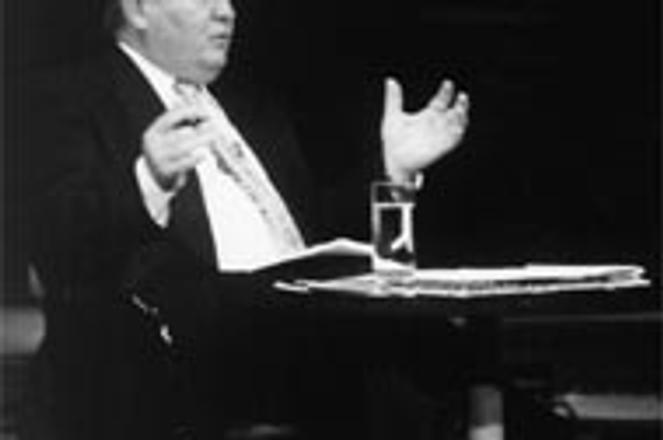Ducký explains the nuts and bolts of the SPP-Gazprom deal.Mišo Poliak
A series of agreements forged between Russian Prime Minister Victor Chernomyrdin and Slovak Premier Vladimír Mečiar in late April 1997 helped secure Slovakia's energy needs for the future. The list of agreements included a "joint venture" between Slovakia's most profitable company in 1996, Slovenský plynárenský priemysel (Slovak Gas Industry or SPP) and the largest Russian company Gazprom.
Last year's published figures reveal that SPP - made 13.79 billion SK ($418 million) - in gross profits, while the Russian fuel giant Gazprom contributed more than one quarter of all taxes paid in Russia last year to the state budget.
Precise details of the SPP/Gazprom agreement were not published, but Mečiar reported that the deal signed between the two companies regarded the long-term transit and supplies of gas from Russia to Slovakia, and would remain in force until 2008.
Explaining the deal
SPP General Manager Ján Ducký was more forthcoming. The long-term contract that was signed was for "the transport of gas to western Europe," which would be administered by a 50-50 joint venture between SPP and Gazprom. Slovakia, Ducký promised, would be buying gas for "a very advantageous price...at least 5 USD per thousand cubic meters below any alternative price for Russian gas."
At present, Slovakia uses six billion cubic meters of gas annually, but transports a further 80 billion m3 across its territory to western Europe. Mindful that the transit business is an extremely lucrative one for Slovakia, Ducký hastened to discredit suggestions by opposition politicians that these profits were now to be shared with Gazprom as a result of the joint venture. "In the joint venture there are absolutely no risks for the Slovak side", Ducký said. "The deal has nothing to do with capacities that are already built and paid for by us. Transit is 100 per cent ours."
A rather different situation exists in Poland where the Russians own half of the transit infrastructure because they helped to build it. "We are lucky, because our pipeline was built in the seventies - if it were built now, it would also be half-owned by Russia".
Ducký stressed that the deal was one that made perfect economic sense for Slovakia. "If it was Norwegian gas, we would have to pay the price determined at the Norway - Holland border, plus transit through Holland, Germany and Austria...we could buy it, but someone would have to pay."
With Russian gas, on the other hand, Slovakia buys for a reduced rate determined at the Slovak - Ukraine border, and wins further price concessions for its transit services. "Find me someone who will sell us gas cheaper than the Russians and I'm yours," crowed Ducký .
For all the fine words Ducký had for the deal he was careful to paint himself as having stood up to Russian bullying at the negotiating table. "The contract, as it had been prepared, did not protect the Slovak side from risk. It had none of the three additional clauses that I pushed through myself."
These three clauses, Ducký, said, guarantee first that Gazprom will abide by Slovak energy rules and policy when operating in Slovakia, second, that the deal would take into account future increases in Slovak carrying capacity: and third, that any Russian gas being exported to south-western Europe would be transported across Slovak territory.
"These three changes happened," Ducký repeated, "and they weren't in place when I became director."
Ducký reported that only 60 percent of the gas purchased from Gazprom will be paid for in dollars - exactly 40 percent will be exchanged for exports of Slovak goods to Russia, a figure which is "neither the under-40 figure that the Russians wanted, nor the over-40 that I wanted" he admitted.
And while the goods-for-gas equation will go some way towards correcting Slovakia's trade imbalance, 49.5 billion Sk ($1.5 billion) in 1996, the duration of the deal as a whole will ensure only the orderly development of Slovak gas transit infrastructure.
"Pipelines are not built according to (economic) plans, but according to (actual) contracts, because they are so expensive. First you arrange a contract, say, for the first deliveries of gas to arrive in Italy in 1998, and then you either increase your capacity or build new pipelines, according to your physical capacity levels," said Ducký. SPP's brightest future lies to the southwest. "The Russians will have to sell gas to someone, who will then have to transport it and buy it through us. I am only praying that they do sell it, because that would mean a pipeline to South-western Europe," he said.
Despite Ducký's brave words, the Slovak public is not really that informed about the nuts and bolts of the Gazprom deal, or indeed about any of the 16 commercial, nuclear and military agreements signed during Chernomyrdin's visit April 28 and 29. Questions remain whether SPP as the smaller company in the deal will be able to protect its interests in the joint venture. But with none of the agreements public knowledge, it is impossible to tell. Ducký explained the cloak of secrecy as "logical." "If you let the competition know you have a better price, they will go and ask for the same price themselves."
Special reporting by Daniel Borský


